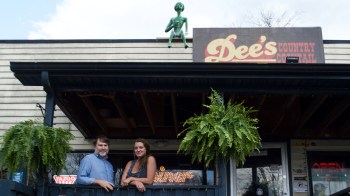Nashville’s Music City Center hopes to make a lasting note
Nashville’s Music City Center hopes to make a lasting note
This morning, city officials in Nashville cut the ribbon on the largest public building project in its history — a new convention hall called the Music City Center.
But Nashville isn’t just the latest city to open a convention center. These mammoth buildings are opening or getting facelifts coast-to-coast. And standing out now takes more than a huge exhibition space and easy access.
“Once upon a time, convention centers were referred to as a ‘box with docks,’” says TVS Design principal Andy McLean. “There was not a lot of architecture going on.”
McLean’s Atlanta-based firm designed the Music City Center along with more than 60 other convention centers around the country, including a recent facelift to the Cobo Center in Detroit.
McLean calls Nashville’s center a “culmination” after years of design evolution. There’s natural light everywhere and glass on all sides, meant to cut down on the fortress-like feeling. The glass offers good views of the city, but it also has a practical function. The nearby buildings should help visitors orient themselves in the convention center.
“Many times you get in convention centers, you get lost. You don’t know where you are,” says Seab Tuck of Nashville-based Tuck Hinton Architects, part of the design team. “This building is so simple.”
Instead of a maze of hallways, there is essentially a ring of open corridors that surround the exhibit space, ballrooms and meeting rooms.
In terms of creature comforts, there is free Wi-Fi. There’s a plan to allow conventioneers headed to the airport to check their bags at the center giving them more time to roam the city.
On the softer side, this building had a $2 million art budget, with specially commissioned pieces. Many are inspired by one of the city’s leading industries: music.

The 1.2 million-square-foot building itself has takes cues from the city’s calling card. From the air, part of the roof looks like an acoustic guitar body. The four-acre green roof has hints of a fret board. The 57,000 square foot grand ballroom is meant to look like the inside of an acoustic guitar.
The rippled roof is probably the most iconic feature, running the three-block length of the building. It made the project more expensive because it cut down on repetitive structural forms. Each crossbeam had to be specially designed.
The exhibit hall is far from the biggest, but it’s intended to have unique capabilities. For instance, 400 anchor points in the rafters can each support as much as one ton, giving the ability to hoist small cars into the air.
City officials have been on the defensive about the nearly $600 million price tag, even though it’s supposed to be paid for by visitor taxes on hotels and rental cars.
They hope the design will help distinguish Nashville among convention destinations, because there are several projects in the pipeline. Cleveland opens a new facility this summer. And some of the country’s largest convention centers have seen business drop off in an increasingly saturated market.
“We’re going to do very well. We’ve been doing well,” predicts Nashville Mayor Karl Dean. “We’re not asking the building to suddenly make Nashville a popular place to come to. It already is.”
There’s a lot happening in the world. Through it all, Marketplace is here for you.
You rely on Marketplace to break down the world’s events and tell you how it affects you in a fact-based, approachable way. We rely on your financial support to keep making that possible.
Your donation today powers the independent journalism that you rely on. For just $5/month, you can help sustain Marketplace so we can keep reporting on the things that matter to you.



















